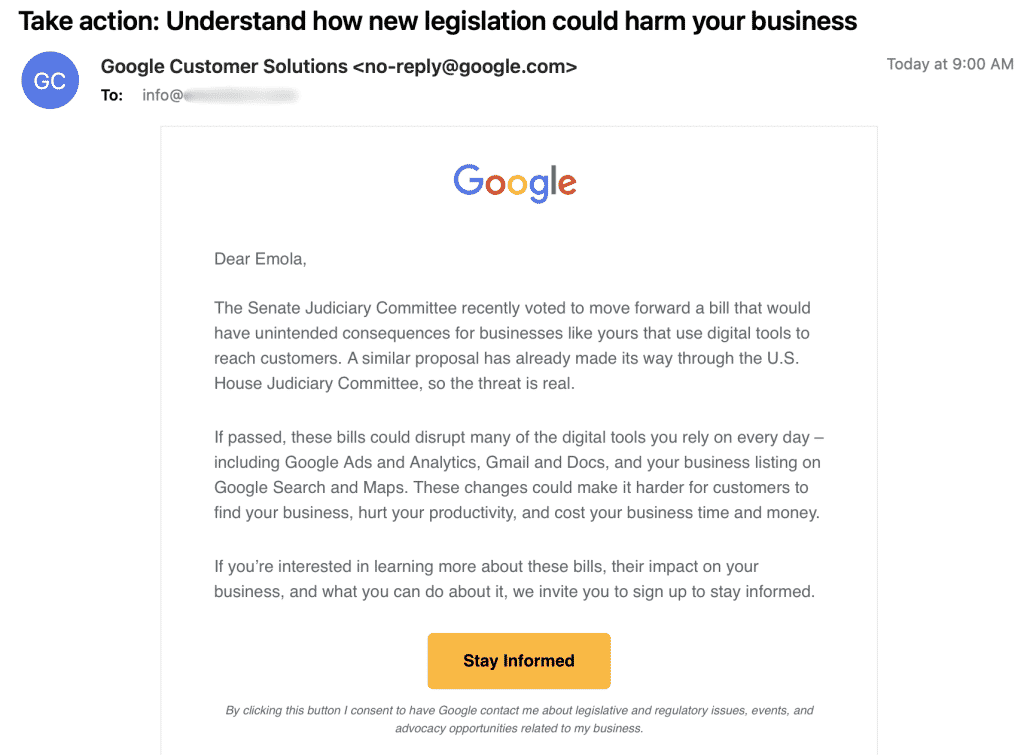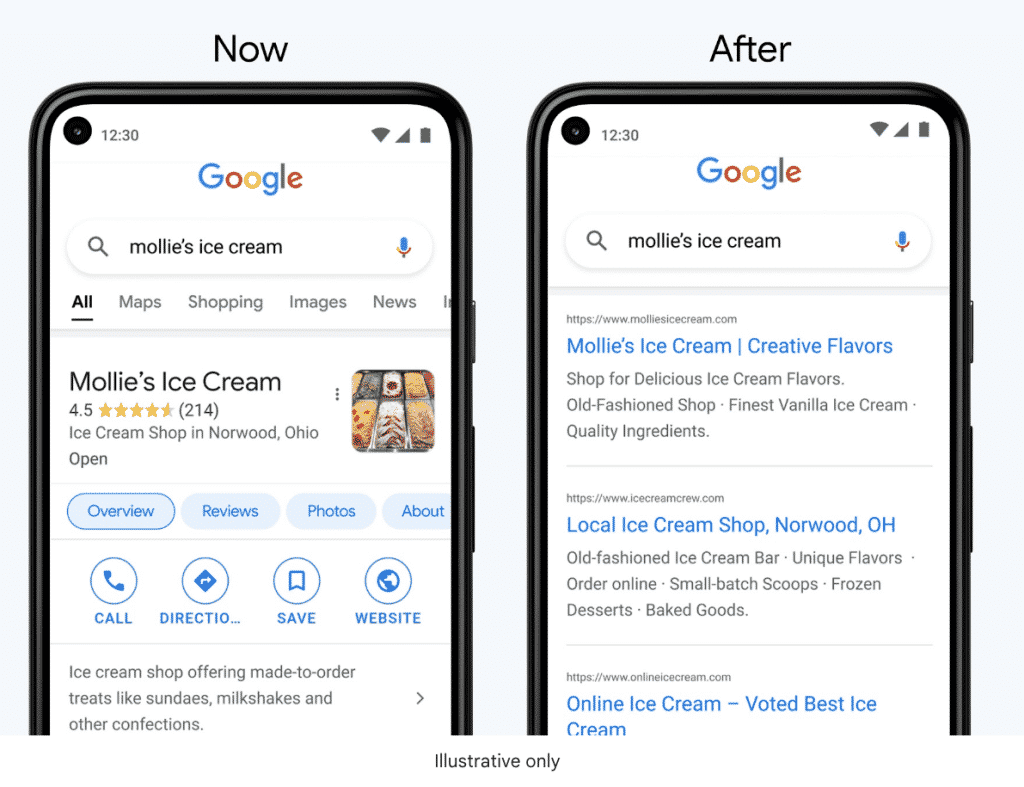Google is sending out emails to businesses, using a type of scare tactic, to inform them that upcoming legislation could harm their business. In the email, they state that if legislative bills are passed, the changes could make it harder for customers to find your business, hurt your productivity, and cost your business time and money. In reality, the legislation is designed to ultimately protect businesses from companies like Google.
Above, you can see a copy of the email being sent to businesses, especially local businesses who have a Google Business Profile listing. The text of the email is below:
“The Senate Judiciary Committee recently voted to move forward a bill that would have unintended consequences for businesses like yours that use digital tools to reach customers. A similar proposal has already made its way through the U.S. House Judiciary Committee, so the threat is real.
If passed, these bills could disrupt many of the digital tools you rely on every day – including Google Ads and Analytics, Gmail and Docs, and your business listing on Google Search and Maps. These changes could make it harder for customers to find your business, hurt your productivity, and cost your business time and money.
If you’re interested in learning more about these bills, their impact on your business, and what you can do about it, we invite you to sign up to stay informed.
— button to ‘opt in’ to receiving Google’s emails like this one —
By clicking this button I consent to have Google contact me about legislative and regulatory issues, events, and advocacy opportunities related to my business.
Google’s public policy team is working with members of Congress to share concerns about how these bills could impact businesses like yours. Together, we can be an important voice in the policy conversation about the regulations that affect you and your business.
Thank you,
The Google Customer Solutions Team
Google ”
Even after signing up, which I did for one of the emails I received like this one, you’re just taken to a confirmation page that says that you’ve opted into receiving the emails about “digital regulation”. There are no specifics about what Google’s concerned about, and what bills specifically are an issue for them. You would think that after you signed up, they might take that opportunity to direct to you to one of their recent blog posts, such as this one, where they posted about legislation that could affect your business. In one particular blog post, titled, “The harmful consequences of Congress’s anti-tech bills”, Google admits that 90 percent of Americans like our products and services:
Every day, millions of Americans use online services like Google Search, Maps and Gmail to find new information and get things done. Research shows these free services provide thousands of dollars a year in value to the average American, and polls show that 90% of Americans like our products and services.
Do you think that it’s 90 percent of Americans like Google’s products and services because they have chosen to use Google’s products or services? Or is it actually that 90 percent of Americans don’t really have a choice but to use Google’s products or services. For example, there are really only two choices of cell phones in America that we can use: Apple or Android. Many choose Android because it “costs less”. And, Google’s made sure that even Apple users use their search engine rather than another. Google’s literally paying Apple to stay out of the search business.
Google goes on to say that legislation could actually break these services, damaging American competitiveness:
“…legislation being debated in the House and Senate could break these and other popular online services, making them less helpful and less secure, and damaging American competitiveness.”
Wait, what?!? Google’s saying that if Google’s services are broken up, broken up into separate companies, they would be less helpful and less secure? And damage American competitiveness? They’d be less helpful, because Google wouldn’t be able to share data about you with their other divisions, and therefore there would be less customization of your search results. Less customization of ads that they put in front of you. Less secure? I am not sure about that. But if Google’s broken up into separate companies, how will it damage American competitiveness? I see it quite the opposite. In fact, it would open it up to American companies actually being able to compete with the behemoth that is Google. Consumers might actually have a better choice of which map service to use, rather than being forced to use Google Maps.
Tougher to Find Local Businesses
Google, in another statement, goes on to say that it will be TOUGHER for consumers to find your business. They give the example of when Google Maps wouldn’t be allowed to be integrated into Google’s search results if bills are passed:
If passed, these bills could cost your business time and money by:
Making it harder for customers to find you because your business listing (including your phone number, address, and business hours) may no longer appear on Google Search and Maps.
Here is the example that they give us:
Oh my gosh, I cannot believe that this is the example that Google’s actually giving us. Let’s think about this for a second. If Google is not allowed to show Google Maps data in their search engine results pages, then Google might actually be forced to show the local businesses’ websites at the top of the search engine results. A searcher might actually have to click through TO THE LOCAL BUSINESS WEBSITE in order to find their phone number and contact information. Rather than just seeing that information in the search engine results, and clicking on the Google Maps listing and never leaving Google. Oh the horror! What would we do if we actually had to click through and visit a local business website! (Of course, I’m being factious here.) What local businesses want, and what business owners like myself want, is for searchers to visit our websites. That’s why we create them. Google has been focused on keeping visitors on Google-owned properties and NOT letting them leave. That’s how they make money. The longer someone is on a Google-owned property, the more money they can make through advertising.
So now do you see why Google’s trying to scare us, scare businesses into thinking that it would be BAD if Google was broken up into separate companies? Would it be such a bad thing if Google Maps, Google Advertising, Google Search, and Android were all separate companies? What’s the worst thing that could happen? When we went to Google, we’d actually have to click through to a local business website in order to get directions, get the phone number, or contact them.
The overall message I’m getting for Google, as a consumer and as a business owner, is “If this legislation passes, it’s going to affect your business.” I actually read this as, “We don’t have any valid reason as to why we shouldn’t be regulated, so let’s pass the buck and make business owners think that it’s going to have a huge impact on them. Tell them they’re going to lose customers and lose business and it will affect their bottom line because they might have to start using a service other than Google to find their business.” Of course that’s an just me over exaggerating, but now that I think about it, it might not be too far off. If Google is broken up into separate businesses, and actually regulated, I think this will be good for businesses, rather than what Google wants businesses to think. Consumers will still go to a search engine or go online to find a local business near them. That’s NOT going to stop, and honestly it will NOT be harder for customers to find them. There will be another search engine, another source for local maps data, I guarantee it.

